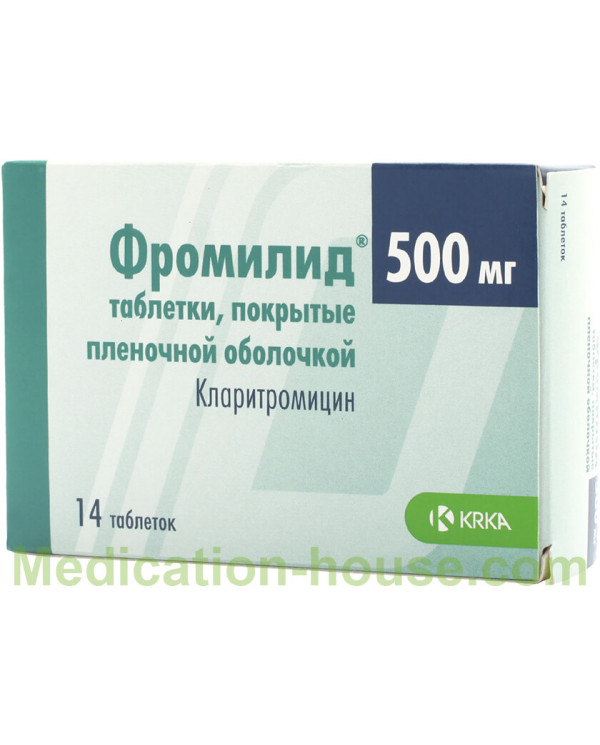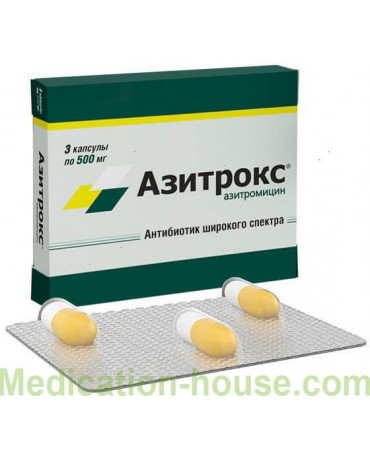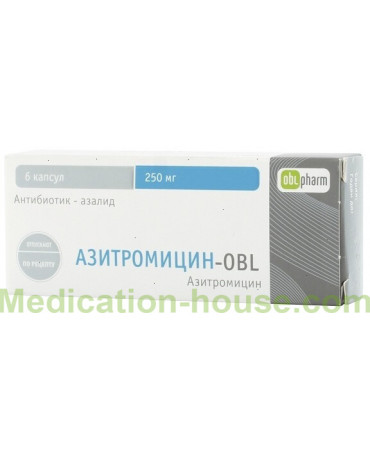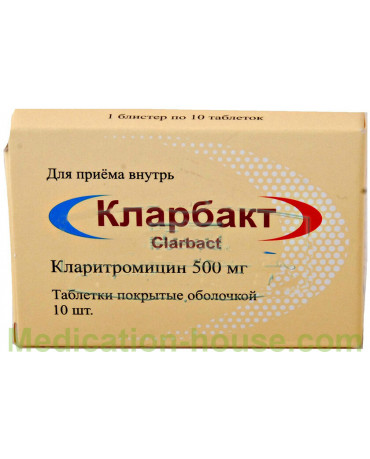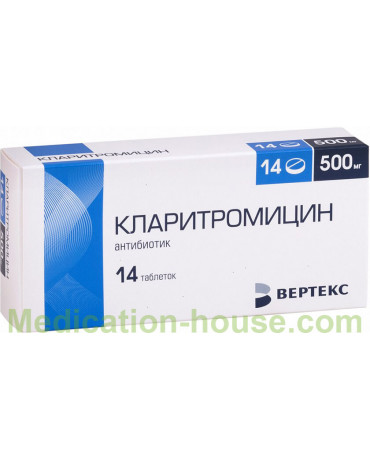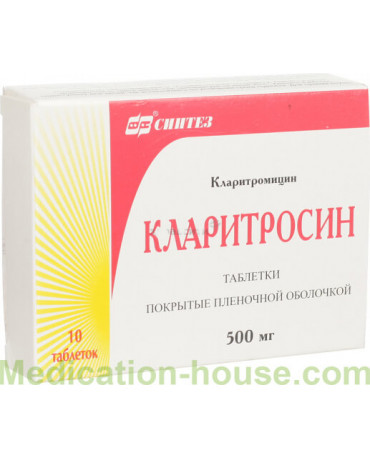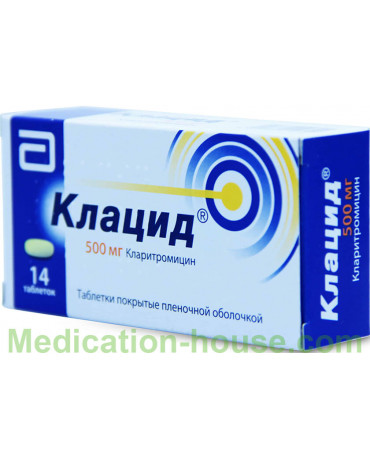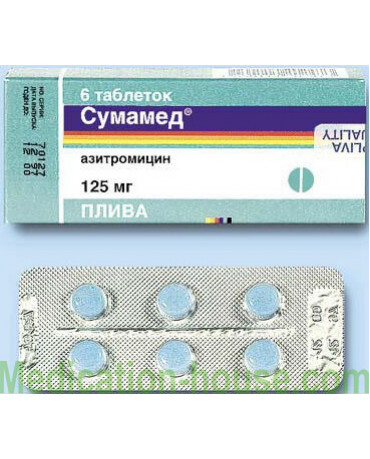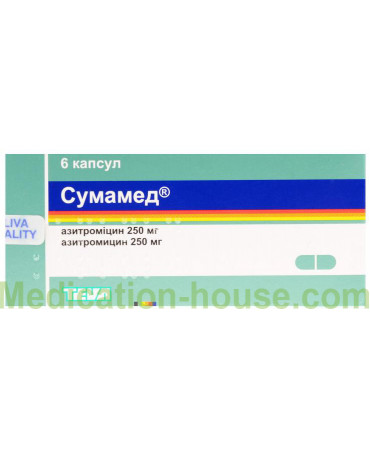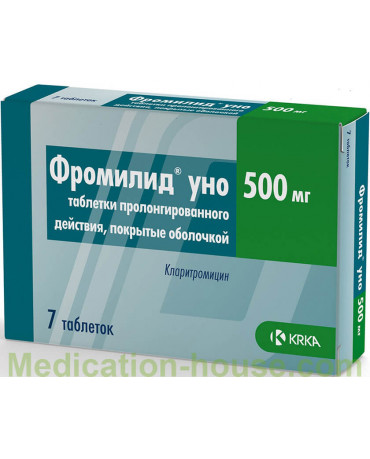Fromilid instruction
You can buy Fromilid on this page
Release form, composition and packaging
Tablets, film coated light yellow color, oval, biconvex; on a break - a white mass with a slightly yellowish shell layer.
1 tab.
clarithromycin - 500 mg
Excipients: corn starch, microcrystalline cellulose (Avicel PH 101, Avicel PH 102), anhydrous colloidal silicon dioxide, pregelatinized starch, potassium polacrilin, talc, magnesium stearate.
The composition of the film shell: hypromellose 6 cps, talc, dye quinoline yellow (E104), propylene glycol, titanium dioxide (E171).
pharmachologic effect
Semisynthetic macrolide antibiotic. Inhibits protein synthesis in the microbial cell. Basically has a bacteriostatic effect. In high concentrations, has a bactericidal effect on Streptococcus pyogenes, Streptococcus pneumoniae and Moraxella catarrhalis.
Active against intracellular microorganisms: Legionella pneumophila, Chlamydia trachomatis, Chlamydia pneumoniae, Ureaplasma urealyticum, Mycoplasma pneumoniae; Gram-positive bacteria: Streptococcus pyogenes, Streptococcus pneumoniae, Streptococcus agalactiae, Streptococcus viridans, Staphylococcus aureus, Listeria monocytogenes, Corynebacterium spp., Bacillus spp .; Gram-negative bacteria: Haemophilus influenzae, Haemophilus ducreyi, Moraxella catarrhalis, Bordetella pertussis, Neisseria gonorrhoeae, Neisseria meningitidis, Borrelia burgdorferi, Pasteurella multocida, Campylobacter spp. and Helicobacter pylori; anaerobic bacteria: Eubacterium spp., Peptococcus spp., Propionibacterium spp., Clostridium perfringens, Bacteroides melaninogenicus. Fromilid is also active against Toxoplasma gondii, Mycobacterium spp. (except Mycobacterium tuberculosis).
Pharmacokinetics
Suction
After oral administration, clarithromycin is well absorbed from the gastrointestinal tract. Bioavailability by ingestion - 55%. Food slows down the absorption, but does not significantly affect the bioavailability of clarithromycin. Cmax is reached in less than 3 hours.
Distribution
Plasma protein binding - more than 90%.
With regular intake of 250 mg / day, the Css of the unchanged substance is 0.62–0.84 µg / ml, the main metabolite is 0.4–0.7 µg / ml, respectively; when increasing the dose to 500 mg / day, the Css of the unchanged substance is 1.77-1.89 µg / ml, its plasma metabolite is 0.67-0.8 µg / ml.
Clarithromycin easily penetrates into tissues (lungs, palatine tonsils, saliva, sputum and middle ear, skin and soft tissues of the body) and body fluids, where it reaches a concentration almost 10 times higher than the concentration in serum.
Metabolism
Approximately 20% of clarithromycin is immediately metabolized in the liver with the participation of CYP3A4, CYP3A5 and CYP3A7 isoenzymes with the formation of the main metabolite, 14-hydroxy-clarithromycin, with pronounced activity against Haemophilus influenzae.
Removal
T1 / 2 after taking Fromilid in a dose of 250 mg is from 3 to 4 hours; after taking a dose of 500 mg - from 5 to 7 hours. From 20 to 30% of clarithromycin (40% when taking a suspension) is excreted unchanged in the urine, the rest is excreted in the form of metabolites.
Indications for use of Fromilid
Treatment of infectious and inflammatory diseases caused by pathogens susceptible to Fromilid, including:
- infections of the upper respiratory tract (acute and chronic tonsillopharyngitis, acute and chronic recurrent sinusitis, acute otitis media);
- infections of the lower respiratory tract (acute bacterial bronchitis, exacerbation of chronic bronchitis, community-acquired bacterial pneumonia, including pneumonia caused by atypical pathogens);
- infections of the skin and soft tissues;
- infections caused by mycobacteria (Mycobacterium avium complex, Mycobacterium kansasii, Mycobacterium marinum, Mycobacterium leprae);
- prevention of the spread of infections caused by the Mycobacterium avium complex (MAC) in HIV-infected patients with a CD4 lymphocyte (T-helper lymphocyte) content of not more than 100 / mm3;
- eradication of Helicobacter pylori in patients with duodenal ulcer or stomach ulcer (always in combination therapy).
Dosing regimen
Fromilid is taken orally. Tablets should be swallowed whole, without breaking, with a small amount of liquid.
Adults and children over the age of 12 years and / or with a body weight of> 33 kg are usually prescribed 250 mg every 12 hours.
For the treatment of acute sinusitis, severe infections and in the case when the infection is caused by Haemophilus influenzae, 500 mg of clarithromycin is prescribed every 12 hours. The course of treatment is 7-14 days.
For the purpose of eradication of Helicobacter pylori Fromilid is prescribed in a dose of 250-500 mg 2 times / day, usually within 7 days, in combination with other drugs.
Children under the age of 12 years and / or with a body weight of <33 kg are prescribed in the form of a suspension in a dose of 15 mg / kg body weight / day, divided into 2 doses. After taking the suspension is recommended to give the child to drink some liquid. The suspension contains tiny granules that should not be chewed, because their contents have a bitter taste. Included is a syringe for oral administration of Fromilid. One filled syringe holds 5 ml of a suspension containing 125 mg of clarithromycin. The syringe should be washed after each use.
The course of treatment usually lasts for 7-14 days.
For the treatment and prevention of the spread of the infection caused by the Mycobacterium avium complex, 500 mg is prescribed every 12 hours. The dose can be increased. The maximum daily dose is 2 g.
For children, the drug Fromilid is prescribed in a dose of 15 mg / kg / day, divided into 2 doses. The dose of the drug should not exceed 500 mg every 12 hours. The maximum daily dose recommended for children is 1 g.
Treatment of infection caused by Mycobacterium avium complex, long, the duration is 6 months or more.
In patients with renal failure with a CC of less than 30 ml / min, or serum creatinine content of more than 290 µmol / L (3.3 mg / dL), the dose should be reduced by 2 times or the interval between doses should be doubled. The maximum duration of treatment in patients of this group is 14 days.
Terms of suspension for oral administration
To prepare the suspension, you need 42 ml of water. Shake the bottle beforehand so that the granules in it are scattered. Add 1/4 of the volume of water to the vial and shake until the granules dissolve. Add the rest of the water and shake well. The volume of the finished suspension should reach the line mark on the bottle.
Side effect
On the part of the digestive system: nausea, vomiting, diarrhea, abdominal pain, stomatitis, glossitis, short-term discoloration of teeth and tongue, pancreatitis, pseudomembranous enterocolitis, cholestatic jaundice, hepatitis. Liver dysfunction can be severe, but usually reversible. Very rarely, cases of liver failure and death, mainly due to severe concomitant diseases and / or concomitant drug therapy.
On the part of the central nervous system and peripheral nervous system: headache, vertigo, paresthesias, drowsiness, hallucinations, convulsions, psychosis, dizziness, confusion, fear, insomnia, nightmares, depersonalization, disorientation.
On the part of the blood system: leukopenia, neutropenia, thrombocytopenia.
On the part of the senses: a change in taste (dysgeusia), smell, tinnitus, short-term hearing loss, taking place after discontinuation of Fromilid.
Since the cardiovascular system: prolongation of the QT interval on the ECG, ventricular tachycardia type "pirouette".
On the part of the respiratory system: shortness of breath.
From the musculoskeletal system: arthralgia, myalgia.
On the part of the urinary system: interstitial nephritis, renal failure.
Metabolism: hypoglycemia in patients taking hypoglycemic drugs.
Allergic reactions: skin rash, urticaria, pruritus, swelling of the face, anaphylactic shock, Stevens-Johnson syndrome, toxic epidermal necrolysis (Lyell's syndrome), angioedema, angioedema.
On the part of the blood coagulation system: unusual bleeding, hemorrhage.
From the laboratory indicators: increased activity of hepatic transaminases and alkaline phosphatase, increased serum levels of bilirubin, creatinine, uric acid, prolongation of prothrombin time.
Others: long-term use may develop cases of superinfection, candidiasis, resistance of microorganisms (pseudomembranous colitis, oral candidiasis).
Contraindications to the use of Fromilid
- severe liver failure;
- Hepatitis (in history);
- porphyria;
- I trimester of pregnancy;
- lactation period;
- simultaneous therapy with terfenadine, cisapride, pimozide or astemizole;
- children's age up to 6 months (for the dosage form - granules for the preparation of a suspension for oral administration) - there is not enough experience regarding the effectiveness and safety of use;
- children's age up to 12 years and / or children weighing less than 33 kg (for the dosage form - tablets, film-coated);
- congenital fructose intolerance, glucose / galactose malabsorption syndrome or deficiency of the enzyme sucrase-isomaltase (only for the dosage form - granules for the preparation of a suspension for oral administration);
- Hypersensitivity to Fromilid;
- Hypersensitivity to other macrolide antibiotics.
Fromilid should be used with caution in patients with moderate to severe renal insufficiency, with liver failure, in the second and third trimesters of pregnancy.
Use of the drug during pregnancy and lactation
Use of the drug Fromilid in the I trimester of pregnancy is contraindicated.
Use of the drug Fromilid in the II and III trimesters of pregnancy is possible only in cases where the expected benefit of therapy for the mother outweighs the potential risk to the fetus.
If necessary, the use of the drug during lactation should stop breastfeeding.
Application for violations of the liver
Patients with mild and moderately impaired liver function do not need to reduce the dose of Fromilid if the kidney function is normal. Patients with severe impaired renal function should reduce the dose.
Application for violations of renal function
Patients with impaired renal function (QC less than 30 ml / min or serum creatinine levels greater than 3.3 mg / dL) should be reduced by 2 times or doubled the interval between doses.
special instructions
When prescribing the drug should be aware that among antibiotics of the macrolide group there is cross-resistance.
Patients with impaired liver function of mild and moderate severity do not need to reduce the dose of Fromilid, if the kidney function is normal. Patients with severe impaired renal function should reduce the dose.
In the presence of chronic liver disease it is necessary to conduct regular monitoring of serum enzymes.
With the simultaneous appointment of drugs metabolized in the liver, it is recommended to control their concentration in blood serum.
Treatment with antibiotics changes the normal flora of the intestines, therefore, the development of superinfection caused by resistant microorganisms is possible.
The patient should be warned that in case of severe persistent diarrhea, which may be due to pseudomembranous colitis, he should consult a doctor.
Prothrombin time should be periodically monitored in patients receiving clarithromycin simultaneously with warfarin or other oral anticoagulants.
125 mg of granules for the preparation of oral suspension 125 mg / 5 ml contain 1.6 g of sucrose, therefore Fromilid is contraindicated in children with congenital fructose intolerance, with glucose / galactose malabsorption syndromes or deficiency of the enzyme sucrase-isomaltase.
Use in pediatrics
Currently, there are insufficient data on the efficacy and safety of the drug in children under the age of 6 months.
Influence on ability to drive motor transport and control mechanisms
Fromilid does not affect the speed of psychomotor reactions when driving or working with mechanisms.
Overdose
Symptoms: vomiting, abdominal pain, headache, confusion.
Treatment: gastric lavage, further symptomatic therapy.
Drug interactions
Clarithromycin is metabolized in the liver and can inhibit the activity of cytochrome P450 isoenzymes. With simultaneous use of clarithromycin and other drugs metabolized with the participation of these isoenzymes, it is possible to increase the concentration of these drugs in the serum and the development of side effects. With simultaneous use of the drug Fromilid with terfenadine, cisapride, pimozide and astemizole, life-threatening arrhythmias may develop (these combinations are contraindicated).
It is recommended to monitor plasma concentrations of theophylline, carbamazepine, digoxin, lovastatin, simvastatin, triazolam, midazolam, phenytoin, cyclosporine, disopyramide, rifabutin, tacrolimus, itraconazole, and ergot alkaloids, because increases the risk of side effects of these drugs when used simultaneously with clarithromycin.
Prothrombin time should be periodically monitored in patients receiving clarithromycin simultaneously with warfarin or other oral anticoagulants.
With simultaneous use of the drug Fromilid and zidovudine, a decrease in the absorption of zidovudine occurs (there is a minimum interval of 4 hours between taking these drugs).
The simultaneous use of ritonavir and clarithromycin leads to a significant increase in the concentration of clarithromycin and a significant decrease in the concentration of its serum 14-hydroxylaritromycin metabolite.
Perhaps the development of cross-resistance between clarithromycin, lincomycin and clindamycin.
Terms and conditions of storage
Tablets should be stored in a dry place inaccessible to children at a temperature not higher than 25 ° C. Shelf life - 5 years.
Terms of sell
You don't need a prescription to buy Fromilid.

